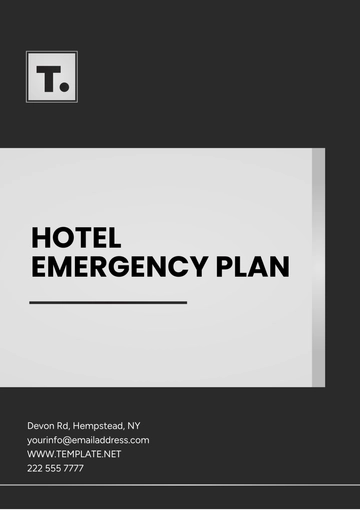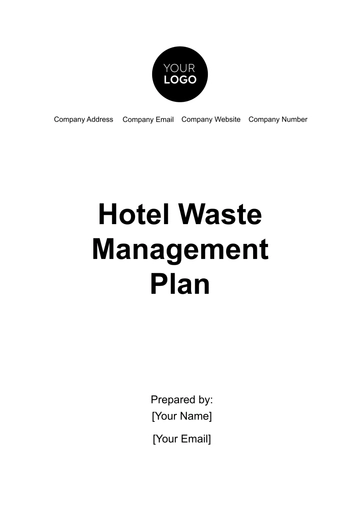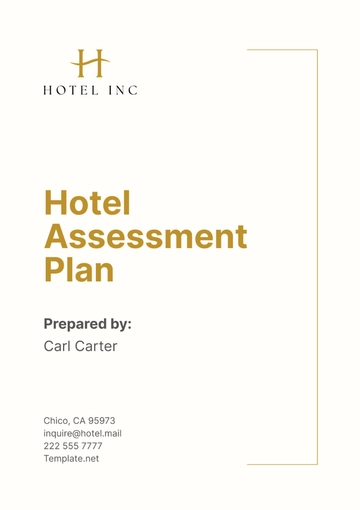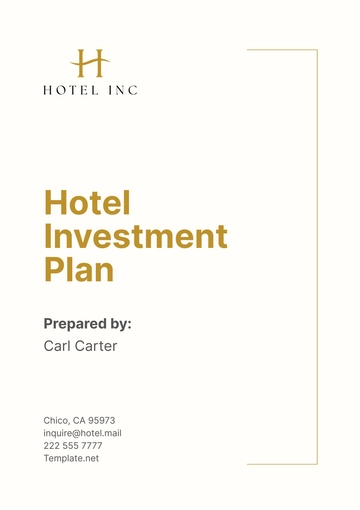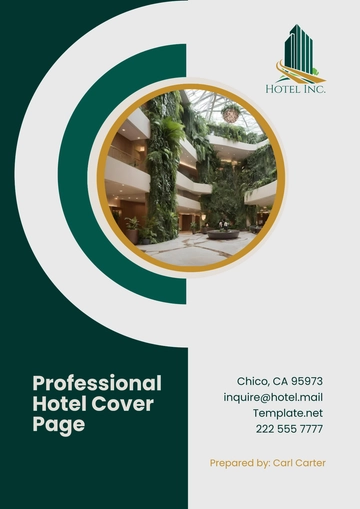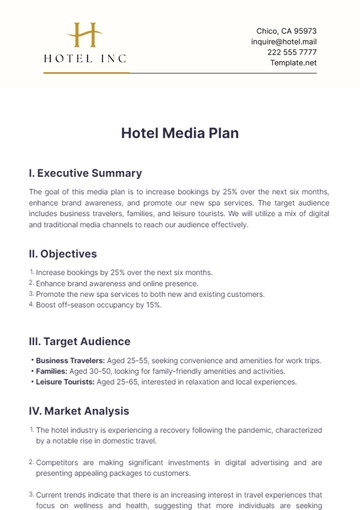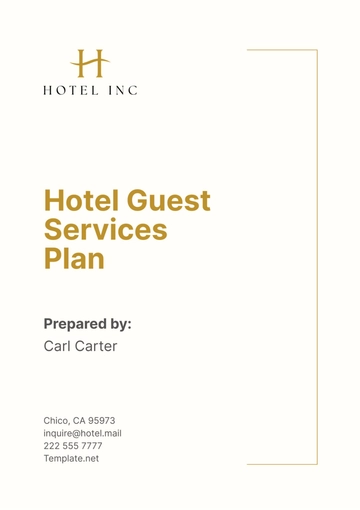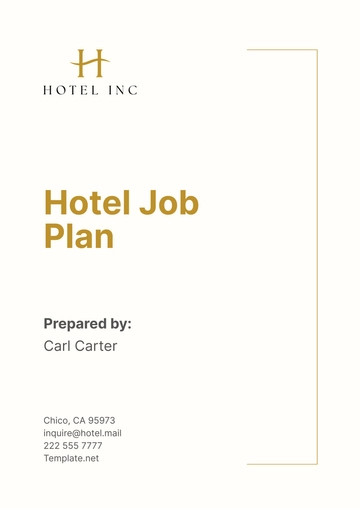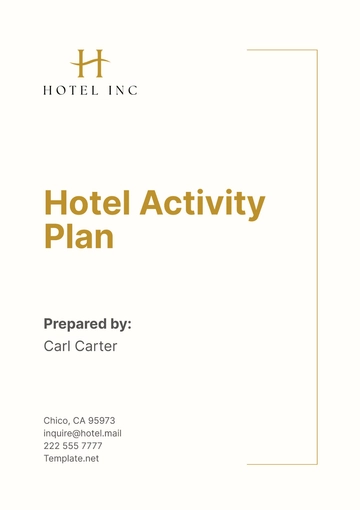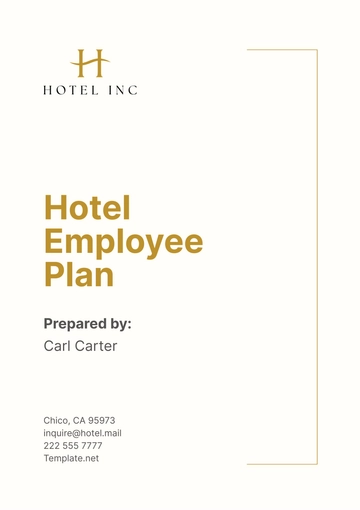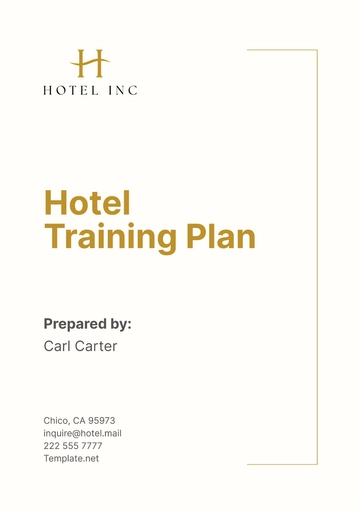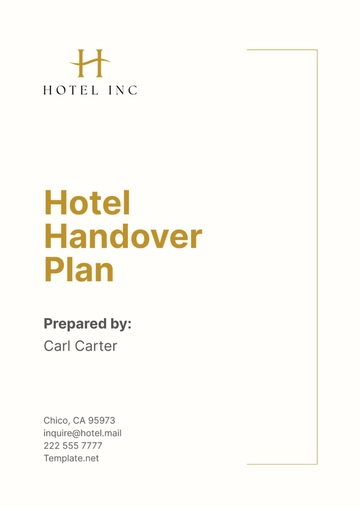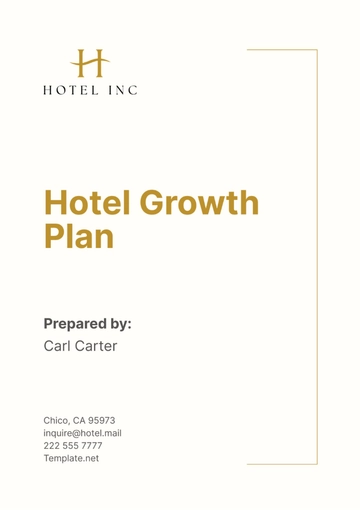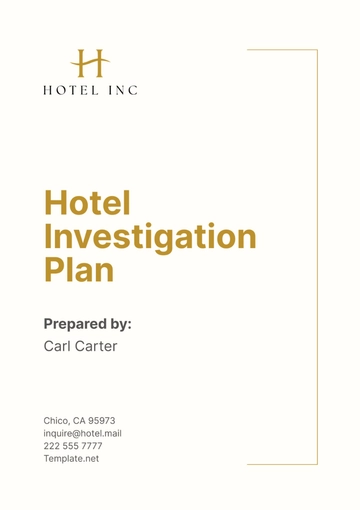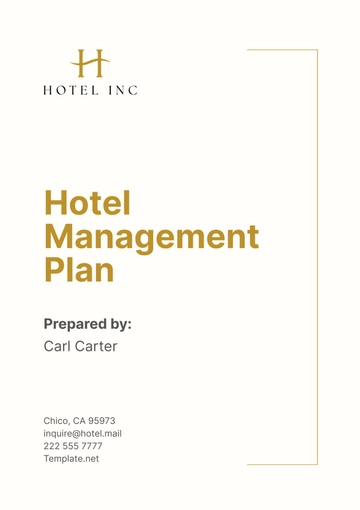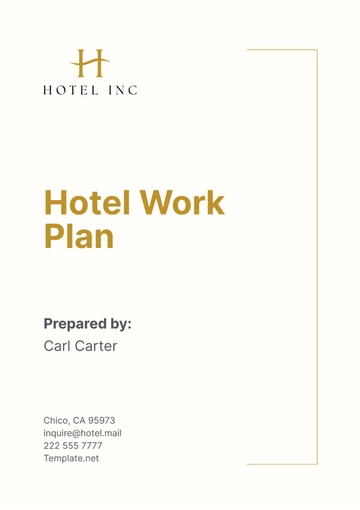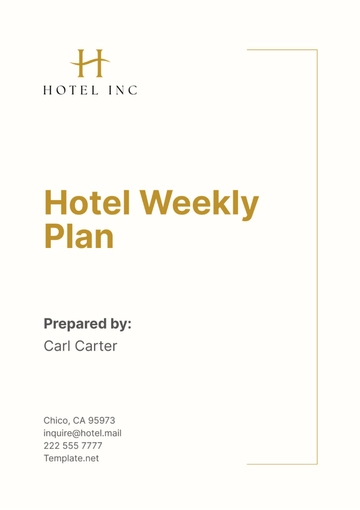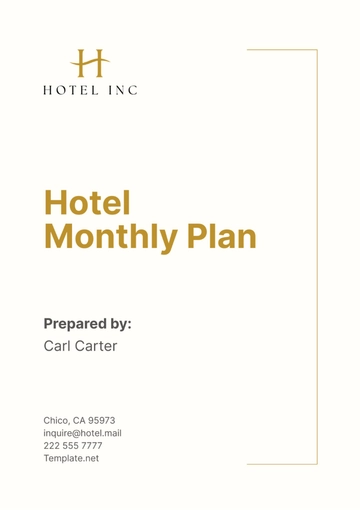Free Hotel Handover Plan
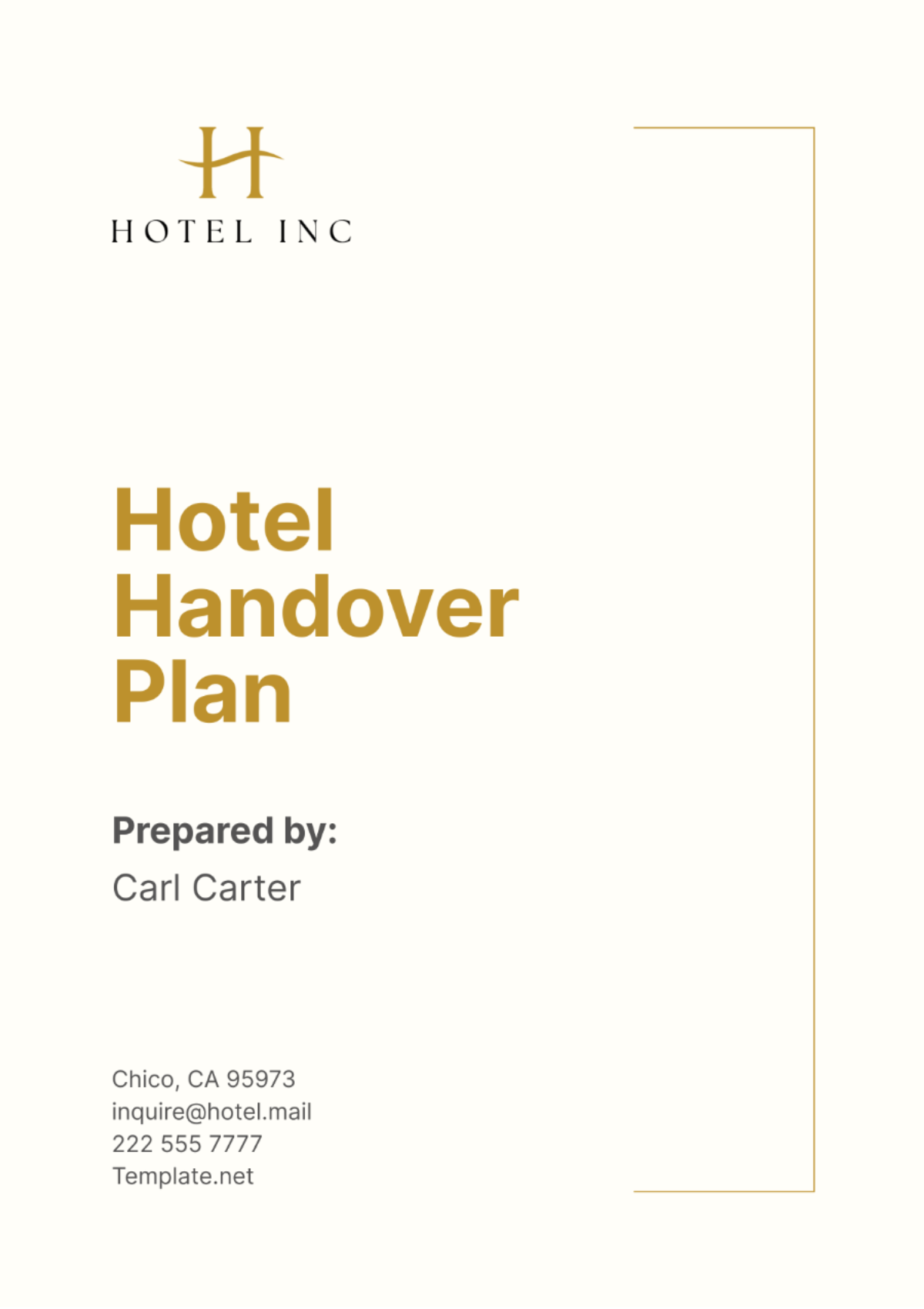
I. Introduction
A. Purpose
The purpose of this Hotel Handover Plan is to provide a comprehensive guide for the seamless transfer of operational responsibilities from the project team to the hotel management team. This plan outlines all the necessary steps, timelines, and stakeholders involved in ensuring a successful handover process. The plan ensures that the hotel operates efficiently from the first day of opening, minimizing disruptions and maximizing guest satisfaction. The document serves as a roadmap for all involved parties, detailing their roles and responsibilities during the transition period.
B. Scope
This handover plan covers all areas of hotel operations, including facilities management, IT systems, staffing, financial management, and guest services. It is intended for use by project managers, hotel managers, department heads, and relevant stakeholders. The plan addresses both pre-opening and post-opening activities to ensure that all systems and processes are in place. It includes detailed checklists, timelines, and contact information to facilitate communication and coordination among all parties involved. By encompassing a wide range of operational aspects, the scope of this plan ensures no detail is overlooked, paving the way for a smooth transition.
II. Project Overview
A. Project Details
Project Name: [Your Company Name] Hotel Handover Project
Project Location: [Your Company Address]
Project Manager: [Your Name]
Start Date: January 1, 2050
End Date: June 30, 2051
This project involves the construction, setup, and operationalization of a state-of-the-art hotel facility designed to provide exceptional guest experiences. The project site is strategically located to attract a diverse clientele, including business travelers, tourists, and event organizers. The Project Manager, [Your Name], will oversee all aspects of the project, ensuring that timelines are met and quality standards are upheld.
B. Key Objectives
Ensure all hotel facilities are fully operational and meet the required standards.
Train hotel staff to operate and manage all hotel systems and services efficiently.
Transfer all necessary documentation, warranties, and maintenance schedules to the hotel management team.
Guarantee a smooth transition with minimal disruption to hotel operations.
These objectives are critical to the successful launch of the hotel. By ensuring that all facilities are fully operational, the project aims to provide a high-quality environment for guests. Comprehensive staff training is essential to maintain service standards and operational efficiency. The transfer of documentation ensures that the hotel management team has all the necessary information to maintain the property. Minimizing disruption during the transition period is crucial to building a positive reputation from the outset.
III. Stakeholder Identification
A. Internal Stakeholders
Project Team: Responsible for the construction and setup of the hotel. This team includes architects, engineers, interior designers, and project coordinators who ensure the hotel is built to specifications and within budget.
Hotel Management Team: Responsible for day-to-day operations post-handover. This team includes the General Manager, department heads, and support staff who will manage all aspects of hotel operations.
Department Heads: Responsible for specific areas such as housekeeping, food and beverage, and front office. Each department head will ensure their respective areas are ready for operation and that staff are adequately trained.
B. External Stakeholders
Contractors: Responsible for the construction and installation of hotel facilities. This includes general contractors, subcontractors, and specialized service providers who deliver and install essential systems and equipment.
Suppliers: Provide the necessary equipment and supplies for hotel operations. Suppliers ensure that the hotel is stocked with furniture, fixtures, linens, toiletries, and other essential items before opening.
Local Authorities: Ensure compliance with local regulations and standards. Local authorities conduct inspections and provide certifications required for the hotel to operate legally.
Guests: The ultimate beneficiaries of the hotel services. Ensuring guest satisfaction is paramount, and their feedback will be crucial for continuous improvement.
IV. Handover Timeline
A. Key Milestones
Construction Completion: April 30, 2051
Facility Inspection and Approval: May 10, 2051
Staff Recruitment and Training: May 1 - June 15, 2051
Systems Testing and Handover: June 1 - June 20, 2051
Final Handover and Operational Start: June 30, 2051
Each milestone represents a critical phase in the handover process. Completing construction on time ensures that subsequent activities can proceed as planned. Facility inspection and approval are necessary to ensure that all systems meet regulatory standards. Staff recruitment and training are crucial for operational readiness. Systems testing verifies that all technological components function correctly. The final handover signifies the official start of hotel operations.
B. Detailed Schedule
Milestone | Start Date | End Date | Responsible Party |
|---|---|---|---|
Construction Completion | January 1, 2050 | April 30, 2051 | Project Team |
Facility Inspection and Approval | May 1, 2051 | May 10, 2051 | Local Authorities |
Staff Recruitment and Training | May 1, 2051 | June 15, 2051 | Hotel Management Team |
Systems Testing and Handover | June 1, 2051 | June 20, 2051 | IT Department |
Final Handover | June 20, 2051 | June 30, 2051 | Project Manager |
This detailed schedule outlines the specific dates and responsible parties for each milestone. It ensures accountability and provides a clear timeline for all stakeholders to follow. Regular progress meetings will be held to monitor adherence to this schedule and address any delays or issues promptly.
V. Facility Handover
A. Facility Inspection
Objective: Ensure all facilities meet the required standards and specifications. The inspection aims to verify that construction has been completed to the highest quality, with all systems functioning correctly and safely.
Inspection Team: Composed of project managers, local authorities, and hotel management representatives. This team will conduct thorough inspections to identify any deficiencies or areas needing improvement.
Inspection Checklist:
Structural integrity of the building: Ensure no structural issues that could pose safety risks.
Safety and security systems: Verify the proper installation and operation of fire alarms, sprinklers, security cameras, and access control systems.
HVAC systems functionality: Ensure heating, ventilation, and air conditioning systems are fully operational and meet environmental standards.
Electrical and plumbing systems: Check for proper installation and operation of electrical wiring, outlets, lighting, plumbing fixtures, and water systems.
Interior finishing and furniture quality: Inspect the quality and condition of wall finishes, flooring, furniture, and fixtures.
Accessibility features: Confirm that the hotel meets accessibility standards for guests with disabilities, including ramps, elevators, and adapted rooms.
B. Documentation Transfer
Documents to be Transferred:
Building plans and blueprints: Provide detailed plans to the hotel management team for future reference and maintenance purposes.
Operation and maintenance manuals: Include manuals for all major systems and equipment to ensure proper operation and maintenance.
Warranty certificates: Transfer warranties for all equipment, furniture, and systems to ensure the hotel can claim repairs or replacements if needed.
Safety and compliance certificates: Provide certificates from local authorities confirming the hotel meets all regulatory requirements.
Asset inventory lists: Detailed lists of all assets, including furniture, equipment, and supplies, to help the management team keep track of inventory.
Responsible Party: Project Team
VI. IT Systems Handover
A. System Overview
Scope: Includes property management systems (PMS), point of sale systems (POS), booking engines, and network infrastructure. These systems are essential for managing reservations, transactions, and connectivity within the hotel.
Key Systems:
PMS: Manages reservations, check-ins, check-outs, and billing. This system integrates with other hotel systems to provide a seamless guest experience.
POS: Handles transactions in restaurants, bars, and retail outlets. Ensures accurate and efficient payment processing.
Booking Engine: Manages online reservations. Provides an easy-to-use platform for guests to book rooms and services directly through the hotel's website.
Network Infrastructure: Ensures robust Wi-Fi and internet services. Includes high-speed internet access for guests and secure networks for hotel operations.
B. Testing and Training
Conduct thorough testing of all IT systems to ensure they are fully functional and integrated. This includes stress testing, security testing, and user acceptance testing to identify and resolve any issues before the hotel opens.
Training:
Staff Training: Train hotel staff on the use of all IT systems. Provide hands-on training sessions and user manuals to ensure staff are comfortable and proficient with the systems.
IT Support: Ensure ongoing IT support is available for troubleshooting and maintenance. Establish a helpdesk and provide contact information for immediate assistance with any IT-related issues.
VII. Staffing Handover
A. Recruitment
Identify and recruit staff for all hotel departments. This includes developing job descriptions, advertising positions, conducting interviews, and selecting qualified candidates.
Positions to be Filled:
Front Office Staff: Responsible for guest check-in and check-out, reservations, and concierge services.
Housekeeping Staff: Ensure guest rooms and public areas are clean and well-maintained.
Food and Beverage Staff: Provide high-quality dining experiences in the hotel’s restaurants, bars, and banquet facilities.
Maintenance Staff: Responsible for the upkeep of the hotel’s physical infrastructure and responding to maintenance requests.
Management Team: Includes the General Manager, department heads, and other key leadership positions to oversee hotel operations.
B. Training Programs
General Training:
Company culture and values: Introduce new employees to the hotel’s mission, vision, and core values to ensure a unified approach to guest service.
Guest service standards: Train staff on the hotel’s standards for guest interaction, emphasizing courtesy, professionalism, and responsiveness.
Department-Specific Training:
Front Office: Reservation and check-in procedures. Training on the PMS, handling guest inquiries, and managing front desk operations.
Housekeeping: Cleaning protocols and standards. Training on the use of cleaning equipment, safety procedures, and maintaining high cleanliness standards.
Food and Beverage: Service techniques and safety standards. Training on menu knowledge, food safety, and customer service in dining settings.
Maintenance: Facility upkeep and emergency procedures. Training on routine maintenance tasks, troubleshooting common issues, and responding to emergencies.
VIII. Financial Handover
A. Budget and Financial Records
Budget Overview: Detailed financial overview including initial budget, actual expenditure, and remaining funds. This ensures transparency and accountability in financial management.
Financial Records: Transfer all financial records including invoices, receipts, and financial statements to the hotel management team. These records are essential for auditing and financial planning purposes.
B. Financial Systems
Accounting Software: Ensure the hotel management team is trained in using the accounting software. This software will be used for tracking income and expenses, payroll, and financial reporting.
Bank Accounts: Set up and transfer control of hotel bank accounts. This includes opening accounts in the hotel’s name and ensuring authorized signatories are established.
IX. Guest Services Handover
A. Service Standards
Guest Experience: Establish high standards for guest services to ensure a positive guest experience. This includes setting expectations for staff behavior, response times, and service quality.
Service Protocols: Develop detailed service protocols for all guest interactions. These protocols cover everything from check-in procedures to handling guest complaints, ensuring consistency in service delivery.
B. Feedback and Continuous Improvement
Guest Feedback Systems: Implement systems to gather and analyze guest feedback. This includes online surveys, comment cards, and direct feedback mechanisms.
Continuous Improvement: Use feedback to continuously improve guest services. Regularly review feedback, identify trends, and implement changes to enhance the guest experience.
X. Risk Management
A. Risk Assessment
Risk Identification: Identify potential risks associated with the handover process. This includes risks related to construction delays, system failures, staff shortages, and regulatory compliance.
Risk Mitigation: Develop strategies to mitigate identified risks. This includes contingency planning, regular progress reviews, and proactive problem-solving measures.
B. Contingency Plans
Contingency Planning: Create contingency plans for critical issues that may arise during the handover process. This ensures that alternative plans are in place to address unforeseen challenges.
Emergency Response: Establish emergency response protocols and train staff accordingly. This includes fire evacuation plans, medical emergency procedures, and communication plans for crises.
XI. Final Handover Meeting
A. Meeting Agenda
Review Handover Checklist: Ensure all items on the handover checklist are completed. This final review ensures that nothing has been overlooked and that the hotel is ready for operation.
Sign-Offs: Obtain sign-offs from all relevant stakeholders confirming the completion of the handover process. This formalizes the transfer of responsibilities and acknowledges the readiness of the hotel.
Feedback Session: Conduct a session to gather feedback on the handover process and identify areas for improvement. This feedback will be valuable for future projects and handovers.
B. Handover Completion Certificate
Issuance: Issue a formal handover completion certificate to mark the successful transition of operational responsibilities. This certificate serves as an official record of the handover.
Acknowledgment: Ensure all parties acknowledge and accept the handover completion certificate. This includes signatures from key stakeholders to confirm their agreement and satisfaction with the handover.
XII. Conclusion
The successful handover of [Your Company Name] Hotel is critical to ensuring operational efficiency and guest satisfaction. By following this comprehensive handover plan, all stakeholders can collaborate effectively to achieve a seamless transition. Regular reviews and updates to this plan will ensure it remains relevant and effective for future handovers. The meticulous planning and coordination outlined in this document aim to create a solid foundation for the hotel’s operations, leading to long-term success and a positive reputation in the hospitality industry.
XIII. Appendices
A. Handover Checklists
Detailed checklists for each department to ensure all aspects of the handover are covered. These checklists provide a step-by-step guide for each department to follow, ensuring nothing is missed.
B. Contact Information
Project Manager: [Your Name], [Your Email], [Your Company Number]
Hotel General Manager: [Name], [Email], [Company Number]
IT Support: [Contact Details]
Emergency Contacts: [Details]
This contact information ensures that all stakeholders can easily reach each other during the handover process, facilitating prompt communication and problem resolution.
C. Supporting Documents
Copies of all relevant supporting documents, including training materials, maintenance schedules, and financial reports. These documents provide additional information and resources to support the handover process.
- 100% Customizable, free editor
- Access 1 Million+ Templates, photo’s & graphics
- Download or share as a template
- Click and replace photos, graphics, text, backgrounds
- Resize, crop, AI write & more
- Access advanced editor
Ensure seamless transitions with our Hotel Handover Plan Template on Template.net. This editable document provides a structured framework for transferring responsibilities and information between shifts, teams, or departments in hotels. Customize to fit your hotel's specific handover processes and maintain continuity in operations.
You may also like
- Finance Plan
- Construction Plan
- Sales Plan
- Development Plan
- Career Plan
- Budget Plan
- HR Plan
- Education Plan
- Transition Plan
- Work Plan
- Training Plan
- Communication Plan
- Operation Plan
- Health And Safety Plan
- Strategy Plan
- Professional Development Plan
- Advertising Plan
- Risk Management Plan
- Restaurant Plan
- School Plan
- Nursing Home Patient Care Plan
- Nursing Care Plan
- Plan Event
- Startup Plan
- Social Media Plan
- Staffing Plan
- Annual Plan
- Content Plan
- Payment Plan
- Implementation Plan
- Hotel Plan
- Workout Plan
- Accounting Plan
- Campaign Plan
- Essay Plan
- 30 60 90 Day Plan
- Research Plan
- Recruitment Plan
- 90 Day Plan
- Quarterly Plan
- Emergency Plan
- 5 Year Plan
- Gym Plan
- Personal Plan
- IT and Software Plan
- Treatment Plan
- Real Estate Plan
- Law Firm Plan
- Healthcare Plan
- Improvement Plan
- Media Plan
- 5 Year Business Plan
- Learning Plan
- Marketing Campaign Plan
- Travel Agency Plan
- Cleaning Services Plan
- Interior Design Plan
- Performance Plan
- PR Plan
- Birth Plan
- Life Plan
- SEO Plan
- Disaster Recovery Plan
- Continuity Plan
- Launch Plan
- Legal Plan
- Behavior Plan
- Performance Improvement Plan
- Salon Plan
- Security Plan
- Security Management Plan
- Employee Development Plan
- Quality Plan
- Service Improvement Plan
- Growth Plan
- Incident Response Plan
- Basketball Plan
- Emergency Action Plan
- Product Launch Plan
- Spa Plan
- Employee Training Plan
- Data Analysis Plan
- Employee Action Plan
- Territory Plan
- Audit Plan
- Classroom Plan
- Activity Plan
- Parenting Plan
- Care Plan
- Project Execution Plan
- Exercise Plan
- Internship Plan
- Software Development Plan
- Continuous Improvement Plan
- Leave Plan
- 90 Day Sales Plan
- Advertising Agency Plan
- Employee Transition Plan
- Smart Action Plan
- Workplace Safety Plan
- Behavior Change Plan
- Contingency Plan
- Continuity of Operations Plan
- Health Plan
- Quality Control Plan
- Self Plan
- Sports Development Plan
- Change Management Plan
- Ecommerce Plan
- Personal Financial Plan
- Process Improvement Plan
- 30-60-90 Day Sales Plan
- Crisis Management Plan
- Engagement Plan
- Execution Plan
- Pandemic Plan
- Quality Assurance Plan
- Service Continuity Plan
- Agile Project Plan
- Fundraising Plan
- Job Transition Plan
- Asset Maintenance Plan
- Maintenance Plan
- Software Test Plan
- Staff Training and Development Plan
- 3 Year Plan
- Brand Activation Plan
- Release Plan
- Resource Plan
- Risk Mitigation Plan
- Teacher Plan
- 30 60 90 Day Plan for New Manager
- Food Safety Plan
- Food Truck Plan
- Hiring Plan
- Quality Management Plan
- Wellness Plan
- Behavior Intervention Plan
- Bonus Plan
- Investment Plan
- Maternity Leave Plan
- Pandemic Response Plan
- Succession Planning
- Coaching Plan
- Configuration Management Plan
- Remote Work Plan
- Self Care Plan
- Teaching Plan
- 100-Day Plan
- HACCP Plan
- Student Plan
- Sustainability Plan
- 30 60 90 Day Plan for Interview
- Access Plan
- Site Specific Safety Plan
